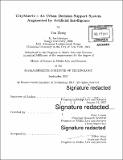| dc.contributor.advisor | Kent Larson. | en_US |
| dc.contributor.author | Zhang, Yan | en_US |
| dc.contributor.other | Program in Media Arts and Sciences (Massachusetts Institute of Technology) | en_US |
| dc.date.accessioned | 2018-03-12T19:28:06Z | |
| dc.date.available | 2018-03-12T19:28:06Z | |
| dc.date.copyright | 2017 | en_US |
| dc.date.issued | 2017 | en_US |
| dc.identifier.uri | http://hdl.handle.net/1721.1/114059 | |
| dc.description | Thesis: S.M., Massachusetts Institute of Technology, School of Architecture and Planning, Program in Media Arts and Sciences, 2017. | en_US |
| dc.description | Cataloged from PDF version of thesis. | en_US |
| dc.description | Includes bibliographical references (pages 75-77). | en_US |
| dc.description.abstract | Cities are our future. Ninety percent of the world's population growth is expected to take place in cities. Not only are cities becoming bigger, they are also becoming more complex and changing even more rapidly. The decision-making process in urban design and urban planning is outdated. Currently, urban decision-making is mostly a top-down process, with community participation only in its late stages. Furthermore, many design decisions are subjective, rather than based on quantifiable performance and data. Urban simulation and artificial intelligence techniques have become more mature and accessible. However, until now these techniques have not been integrated into the urban decision-making process. Current tools for urban planning do not allow both expert and non-expert stakeholders to explore a range of complex scenarios rapidly with real-time feedback. To address these challenges, a dynamic, evidence-based decision support system called CityMatrix was prototyped. The goals of CityMatrix were 1) Designing an intuitive Tangible User Interface (TUI) to improve the accessibility of the decision-making process for non-experts. 2) Creating real-time feedback of multi-objective urban performances to help users evaluate their decisions, thus to enable rapid, collaborative decision-making. 3) Constructing a suggestion-making system that frees stakeholders from excessive, quantitative considerations and allows them to focus on the qualitative aspects of the city, thus helping them define and achieve their goals more efficiently. CityMatrix was augmented by Artificial Intelligence (AI) techniques including Machine Learning simulation predictions and optimization search algorithms. The hypothesis explored in this work was that the decision quality could be improved by the organic combination of both strength of human intelligence and machine intelligence. The system was pilot-tested and evaluated by comparing the problem-solving results of volunteers, with or without Al suggestions. Both quantitative and qualitative analytic results showed that CityMatrix is a promising tool that helps both professional and nonprofessional users understand the city better to make more collaborative and better-informed decisions. CityMatrix was an effort towards evidence-based, democratic decisionmaking. Its contributions lie in the application of Machine Learning as a versatile, quick, accurate, and low-cost approach to enable real-time feedback of complex urban simulations and the implementation of the optimization searching algorithms to provide open-ended decision-making suggestions. | en_US |
| dc.description.statementofresponsibility | by Yan Zhang. | en_US |
| dc.format.extent | 77 pages | en_US |
| dc.language.iso | eng | en_US |
| dc.publisher | Massachusetts Institute of Technology | en_US |
| dc.rights | MIT theses are protected by copyright. They may be viewed, downloaded, or printed from this source but further reproduction or distribution in any format is prohibited without written permission. | en_US |
| dc.rights.uri | http://dspace.mit.edu/handle/1721.1/7582 | en_US |
| dc.subject | Program in Media Arts and Sciences () | en_US |
| dc.title | CityMatrix : an urban decision support system augmented by artificial intelligence | en_US |
| dc.title.alternative | City Matrix : an urban decision support system augmented by artificial intelligence | en_US |
| dc.title.alternative | Urban decision support system augmented by artificial intelligence | en_US |
| dc.type | Thesis | en_US |
| dc.description.degree | S.M. | en_US |
| dc.contributor.department | Program in Media Arts and Sciences (Massachusetts Institute of Technology) | en_US |
| dc.identifier.oclc | 1026496802 | en_US |
